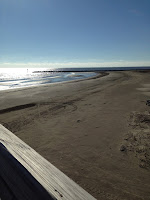 |
| Grand Isle State Park, LA |
West of New Orleans, take Hwy 90 to Raceland. Turn south on Hwy
1 and drive about 60 miles, until you run out of land. And then there’s one
more piece of land – an island - connected by bridge to the mainland. Cross the
bridge and there you are at Grand Isle, at the tip of one of several bayou “peninsulas”
jutting out into the Gulf. There we found Grand Isle State Park. Standing on
its beach I felt a little like I did when we visited the coast of Newfoundland –
at the edge of the world, standing in awe before a very large body of water.
Grand Isle State Park is a small campground with a large
beach area which, I’m sure, on a warm spring day is enjoyed by many locals and
visitors. The January day we were there, in 40-some degree weather – we had the
beach to ourselves.

 The quaint town of Grand Isle likewise is probably humming
with activity during the summer with vacationing guests and seasonal
transplants enjoying the nearby local beaches and the water views on either
side of the island. The town, made up of one main thoroughfare and several
streets of colorful houses on stilts, was mostly quiet and closed the day we
drove through it. However, the few stray strands of Mardi Gras beads at the
street’s edge indicated perhaps a recent parade and some festive revelry. And
the cars parked outside the bar and
grill on a Sunday afternoon showed there were at least a few locals who toughed
out the cool windy weather of winter.
The quaint town of Grand Isle likewise is probably humming
with activity during the summer with vacationing guests and seasonal
transplants enjoying the nearby local beaches and the water views on either
side of the island. The town, made up of one main thoroughfare and several
streets of colorful houses on stilts, was mostly quiet and closed the day we
drove through it. However, the few stray strands of Mardi Gras beads at the
street’s edge indicated perhaps a recent parade and some festive revelry. And
the cars parked outside the bar and
grill on a Sunday afternoon showed there were at least a few locals who toughed
out the cool windy weather of winter. |
| Land of many bridges |
A few of the names on closed-up houses in Grand Isle, LA: Sweet Sue, Serenity, La Bon Vie, Worth the
Wait, Nothing Fancy, Ruff Cs, Big Easy, Six Pack, Law and Disorder.
 It’s a great area for birding. The mainland near Grand Isle
is that bayou mix of watery, reedy, marshy land, where there’s no real
distinction between water and land. There’s water in the ditches, water in
marshes and open water areas. Sea birds are everywhere – in quantities I had
never imagined. Three types of herons, egrets, brown and American pelicans,
roseate spoonbills, ruddy turnstones, herring gulls, and willets, to name a few.
It’s a great area for birding. The mainland near Grand Isle
is that bayou mix of watery, reedy, marshy land, where there’s no real
distinction between water and land. There’s water in the ditches, water in
marshes and open water areas. Sea birds are everywhere – in quantities I had
never imagined. Three types of herons, egrets, brown and American pelicans,
roseate spoonbills, ruddy turnstones, herring gulls, and willets, to name a few.
La Bonnie Vie, indeed!
ReplyDelete